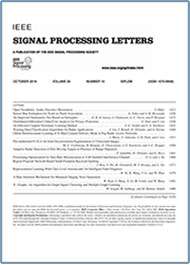- Our Story
- Publications & Resources
- Publications & Resources
- Publications
- IEEE Signal Processing Magazine
- IEEE Journal of Selected Topics in Signal Processing
- IEEE Signal Processing Letters
- IEEE Transactions on Computational Imaging
- IEEE Transactions on Image Processing
- IEEE Transactions on Information Forensics and Security
- IEEE Transactions on Multimedia
- IEEE Transactions on Signal and Information Processing over Networks
- IEEE Transactions on Signal Processing
- IEEE TCI
- IEEE TSIPN
- Data & Challenges
- Submit Manuscript
- Guidelines
- Information for Authors
- Special Issue Deadlines
- Overview Articles
- Top Accessed Articles
- SPS Newsletter
- SigPort
- SPS Resource Center
- Publications FAQ
- Blog
- News
- Dataset Papers
- Conferences & Events
- Community & Involvement
- Professional Development
- For Volunteers
- Information for Authors-OJSP
-
Home
Conferences Events IEEE Signal Processing Magazine IEEE SPL Article IEEE TIFS Article IEEE TMM Article IEEE TSP Article Jobs in Signal Processing Lectures Machine Learning Seasonal Schools Signal Processing News SPM Article SPS Distinguished Lectures SPS Newsletter Article SPS Webinar SPS Webinars SPS Webinar Series Webinar webinars
-
Our Story
What is Signal Processing?

The technology we use, and even rely on, in our everyday lives –computers, radios, video, cell phones – is enabled by signal processing. Learn More » -
Publications & Resources
-
SPS Resources
- Signal Processing Magazine The premier publication of the society.
- SPS Newsletter Monthly updates in Signal Processing
- SPS Resource Center Online library of tutorials, lectures, and presentations.
- SigPort Online repository for reports, papers, and more.
- SPS Feed The latest news, events, and more from the world of Signal Processing.
-
SPS Resources
-
Conferences & Events
-
Community & Involvement
-
Membership
- Join SPS The IEEE Signal Processing Magazine, Conference, Discounts, Awards, Collaborations, and more!
- Chapter Locator Find your local chapter and connect with fellow industry professionals, academics and students
- Women in Signal Processing Networking and engagement opportunities for women across signal processing disciplines
- Students Scholarships, conference discounts, travel grants, SP Cup, VIP Cup, 5-MICC
- Young Professionals Career development opportunities, networking
- Get Involved
-
Technical Committees
- Applied Signal Processing Systems
- Audio and Acoustic Signal Processing
- Bio Imaging and Signal Processing
- Computational Imaging
- Image Video and Multidimensional Signal Processing
- Information Forensics and Security
- Machine Learning for Signal Processing
- Multimedia Signal Processing
- Sensor Array and Multichannel
- Signal Processing for Communication and Networking
- Signal Processing Theory and Methods
- Speech and Language Processing
- Technical Working Groups
- More TC Resources
-
Membership
-
Professional Development
-
Professional Development
- Signal Processing Mentorship Academy (SigMA) Program
- Micro Mentoring Experience Program (MiME)
- Distinguished Lecturer Program
- Distinguished Lecturers
- Distinguished Lecturer Nominations
- Past Lecturers
- Distinguished Industry Speaker Program
- Distinguished Industry Speakers
- Distinguished Industry Speaker Nominations
- Industry Resources
- IEEE Training Materials
- Jobs in Signal Processing: IEEE Job Site
-
Career Resources
- SPS Education Program Educational content in signal processing and related fields.
- Distinguished Lecturer Program Chapters have access to educators and authors in the fields of Signal Processing
- Job Opportunities Signal Processing and Technical Committee specific job opportunities
- Job Submission Form Employers may submit opportunities in the area of Signal Processing.
-
Professional Development
-
For Volunteers
-
For Board & Committee Members
- Board Agenda/Minutes* Agendas, minutes and supporting documentation for Board and Committee Members
- SPS Directory* Directory of volunteers, society and division directory for Board and Committee Members.
- Membership Development Reports* Insight into the Society’s month-over-month and year-over-year growths and declines for Board and Committee Members
-
For Board & Committee Members
Popular Pages
Today's:
- Information for Authors
- (ICIP 2026) 2026 IEEE International Conference on Image Processing
- (ICIP 2025) 2025 IEEE International Conference on Image Processing
- Submit Your Papers for ICASSP 2026!
- Conferences Board
- IEEE Transactions on Information Forensics and Security
- PANNs: Large-scale Pretrained Audio Neural Networks for Audio Pattern Recognition
- IEEE Transactions on Audio, Speech and Language Processing
- Information for Authors-SPL
- Women in Signal Processing
- IEEE Transactions on Multimedia
- (ICME 2026) 2026 IEEE International Conference on Multimedia and Expo
- Guidelines for Associate Editors
- IEEE Signal Processing Letters
- Volunteer Opportunities
All time:
- Information for Authors
- Submit a Manuscript
- IEEE Transactions on Image Processing
- IEEE Transactions on Information Forensics and Security
- IEEE Transactions on Multimedia
- IEEE Transactions on Audio, Speech and Language Processing
- IEEE Signal Processing Letters
- IEEE Transactions on Signal Processing
- Conferences & Events
- IEEE Journal of Selected Topics in Signal Processing
- Information for Authors-SPL
- Conference Call for Papers
- Signal Processing 101
- IEEE Signal Processing Magazine
- Guidelines
Last viewed:
- Volunteer Opportunities
- Women in Signal Processing
- Join a Technical Committee
- About Open Journal of Signal Processing
- IEEE Transactions on Audio, Speech and Language Processing
- (ISBI 2026) 2026 IEEE 23rd International Symposium on Biomedical Imaging
- Video & Image Processing Cup
- Occlusion-Aware Human Mesh Model-Based Gait Recognition
- Submit Your Papers for ICASSP 2026!
- SPCOM TC Home
- (ICIP 2025) 2025 IEEE International Conference on Image Processing
- (ICIP 2026) 2026 IEEE International Conference on Image Processing
- (ICME 2026) 2026 IEEE International Conference on Multimedia and Expo
- Call for Papers for ICASSP 2026 Now Open!
- (ICME 2025) 2025 IEEE International Conference on Multimedia and Expo
A Convex Optimization Approach For NLOS Error Mitigation in TOA-Based Localization
You are here
Publications & Resources
Signal Processing Letters
For Authors
Top Reasons to Join SPS Today!
1. IEEE Signal Processing Magazine
2. Signal Processing Digital Library*
3. Inside Signal Processing Newsletter
4. SPS Resource Center
5. Career advancement & recognition
6. Discounts on conferences and publications
7. Professional networking
8. Communities for students, young professionals, and women
9. Volunteer opportunities
10. Coming soon! PDH/CEU credits
Click here to learn more.
A Convex Optimization Approach For NLOS Error Mitigation in TOA-Based Localization
This paper addresses the target localization problem using time-of-arrival (TOA)-based technique under the non-line-of-sight (NLOS) environment. To alleviate the adverse effect of the NLOS error on localization, a total least square framework integrated with a regularization term (RTLS) is utilized, and with which the localization problem can get rid of the ill-posed issue. However, it is challenging to figure out the exact solution for the considered localization problem. In this case, we convert the RTLS problem into a semidefinite program (SDP), and then obtain the solution of the original problem by solving a generalized trust region subproblem (GTRS). The proposed method has a relatively good robustness in localization even under the circumstance that the prior knowledge of the NLOS links or its distribution does not know. The outperformance of the proposed method is demonstrated in the simulations compared with other state-of-the-art techniques.
Target localization technology plays an important role in various applications, such as positioning and tracking systems [1]–[2][3]. In what concerns the localization technology, time-of-arrival (TOA) based techniques are promising compared with received signal strength (RSS) or time-difference-of-arrival (TDOA) and angle-of-arrival (AOA)-based techniques in terms of the accuracy and the cost. Therefore, the TOA-based techniques have been studied extensively [4], [5].
SPS Social Media
- IEEE SPS Facebook Page https://www.facebook.com/ieeeSPS
- IEEE SPS X Page https://x.com/IEEEsps
- IEEE SPS Instagram Page https://www.instagram.com/ieeesps/?hl=en
- IEEE SPS LinkedIn Page https://www.linkedin.com/company/ieeesps/
- IEEE SPS YouTube Channel https://www.youtube.com/ieeeSPS
Home | Sitemap | Contact | Accessibility | Nondiscrimination Policy | IEEE Ethics Reporting | IEEE Privacy Policy | Terms | Feedback
© Copyright 2025 IEEE - All rights reserved. Use of this website signifies your agreement to the IEEE Terms and Conditions.
A public charity, IEEE is the world's largest technical professional organization dedicated to advancing technology for the benefit of humanity.











